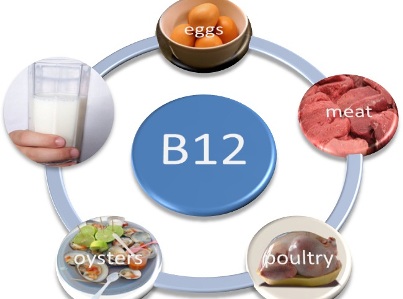Here are the sources for the B vitamins:
B-12 (Cobalamin) : It is commonly found in a variety of animal-sourced foods such as meat, poultry, fish, shellfish, eggs, milk and other dairy products. Processed foods fortified with this vitamin are particularly valuable source of vitamin B-12 for vegetarians – especially strict vegetarians (who do not consume even milk or dairy products or eggs, and may be at risk for deficiency).
Apart from food sources, B-12 can also be taken in the form of supplements – orally or through intra-muscular injections. The new kid on the block is intra-nasal B-12. Folate (Folic Acid is the synthetic form of this vitamin).
Vitamin B-12 sources include leafy green vegetables, citrus fruits (like melons and lemons), legumes (dried beans and peas), cereals, baked goods, yeast, mushrooms, organ meats (e.g., liver, kidney). In addition, foods fortified with folic acid are a major source of this vitamin; it is also found in supplements such as vitamin B-complex formulations.
Sources for the Vitamin B-6 (Pyridoxine): Major sources include cereals, legumes, vegetables (carrots, spinach, peas), potatoes, milk, cheese, eggs, fish, liver and meat. B-6 is frequently used in combination with other B vitamins in vitamin B-complex formulations.
B-22 (Riboflavin): Especially good dietary sources are milk and other dairy products, eggs, meats, liver, green vegetables. If you’re a strict vegetarian, your B-2 intake may be lower, compared to non vegetarians.
Sources for the Vitamin B-2: Vitamin B2 is also found in foods enriched with this vitamin, and in B-complex formulations. A word of caution: Supplements of the B vitamins should be taken under medical supervision, because care needs to be exercised in persons suffering from certain medical conditions. Also, over-dosing carries its own risks. The inject able type of supplements may be more useful for those whose B deficiency is caused by poor absorption rather than poor intake.
Apart from the B vitamins, there are other nutrients that are showing promise in improving depression, although we await much more research. One of them is the omega-3 fatty acids, a form of polyunsaturated fats. There has been some evidence in recent years that an increased intake of omega-3 fatty acids might help treat depression in adults. Currently, a large-scale study sponsored by the National Institute of Mental Health (NIMH) in the U.S. is looking into the effectiveness of two different types of omega-3 fatty acids in treating the symptoms of major depression, with study participants spanning an 18-to-80 year age group. The two types are EPA (eicosapentaenoic acid) and DHA (docosahexanoic acid), which are found mainly in oily, cold water fish, such as tuna, sardines, mackerel and salmon.
Omega-3 fats (fish oil supplements are one rich source) have a direct influence on serotonin levels. According to Dr.J.R.Hibbeln who collated the evidence that fish eaters, viewed from a global perspective, are overall less prone to depression. “It’s like building more serotonin factories. Instead of just increasing the efficiency of the serotonin you have. “Currently, a large-scale U.S. study is looking into the efficacy of fish oils in treating depression in adolescents. The study should be nearing completion by the time this issue is in your hands. (Adolescence, of course, is the highest risk period for the onset of depression, and there is evidence for an increasing trend).
Finally, specific nutrients apart, don’t lose sight of the fact that an overall poor diet may also be a contributor to depression. For instance, treating an underlying condition like iron-deficiency anemia can improve the outlook for a depressed person.
Important: While there is good logic, and growing evidence, that optimum nutrition can be beneficial in depression, none of the nutrients mentioned above is a replacement for conventional therapy. Depression should be treated by a qualified healthcare professional. Also, do not stop taking medications without the advice of a doctor. If you wish to try a herbal or dietary supplement, once again, talk to your doctor before you do so.

